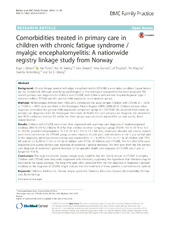Comorbidities treated in primary care in children with chronic fatigue syndrome
Bakken, Inger Johanne; Tveito, Kari; Aaberg, Kari Modalsli; Ghaderi, Sara; Gunnes, Nina; Trogstad, Lill; Magnus, Per; Stoltenberg, Camilla; Håberg, Siri Eldevik
Peer reviewed, Journal article
Published version

Åpne
Permanent lenke
https://hdl.handle.net/1956/13125Utgivelsesdato
2016-09-02Metadata
Vis full innførselSamlinger
Originalversjon
https://doi.org/10.1186/s12875-016-0527-7Sammendrag
Background: Chronic fatigue syndrome/myalgic encephalomyelitis (CFS/ME) is a complex condition. Causal factors are not established, although underlying psychological or immunological susceptibility has been proposed. We studied primary care diagnoses for children with CFS/ME, with children with another hospital diagnosis (type 1 diabetes mellitus [T1DM]) and the general child population as comparison groups. Methods: All Norwegian children born 1992–2012 constituted the study sample. Children with CFS/ME (n = 1670) or T1DM (n = 4937) were identified in the Norwegian Patient Register (NPR) (2008-2014). Children without either diagnosis constituted the general child population comparison group (n = 1337508). We obtained information on primary care diagnoses from the Norwegian Directorate of Health. For each primary care diagnosis, the proportion and 99 % confidence interval (CI) within the three groups was calculated, adjusted for sex and age by direct standardization. Results: Children with CFS/ME were more often registered with a primary care diagnosis of weakness/general tiredness (89.9 % [99 % CI 88.0 to 91.8 %]) than children in either comparison group (T1DM: 14.5 % [99 % CI: 13.1 to 16.0 %], general child population: 11.1 % [99 % CI: 11.0 to 11.2 %]). Also, depressive disorder and anxiety disorder were more common in the CFS/ME group, as were migraine, muscle pain, and infections. In the 2 year period prior to the diagnoses, infectious mononucleosis was registered for 11.1 % (99 % CI 9.1 to 13.1 %) of children with CFS/ ME and for 0.5 % (99 % CI (0.2 to 0.8 %) of children with T1DM. Of children with CFS/ME, 74.6 % (1292/1670) were registered with a prior primary care diagnosis of weakness / general tiredness. The time span from the first primary care diagnosis of weakness / general tiredness to the specialist health care diagnosis of CFS/ME was 1 year or longer for 47.8 %. Conclusions: This large nationwide registry linkage study confirms that the clinical picture in CFS/ME is complex. Children with CFS/ME were frequently diagnosed with infections, supporting the hypothesis that infections may be involved in the causal pathway. The long time span often observed from the first diagnosis of weakness / general tiredness to the diagnosis of CFS/ME might indicate that the treatment of these patients is sometimes not optimal.
